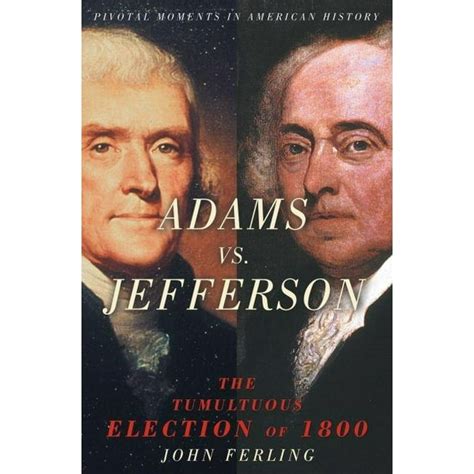The election of 1800 was a groundbreaking event in the history of the United States. It marked the first peaceful transfer of power from one political party to another, setting a precedent for the democratic process that we still cherish today.

Key Players and Candidates
- Thomas Jefferson (Democratic-Republican): Jefferson, a Virginian, was the third President of the United States and a leading figure in the Democratic-Republican Party.
- John Adams (Federalist): Adams, a Massachusetts native, was the second President of the United States and a staunch Federalist.
- Aaron Burr (Democratic-Republican): Burr, a New Yorker, served as Vice President under Jefferson and was initially a candidate for President.
The Election Process
The Electoral College, established by the Constitution, cast 138 electoral votes. To win the presidency, a candidate needed a majority of votes, or 70. However, a quirk in the system led to a tie between Jefferson and Burr.
Contested Results and Resolution
The House of Representatives, responsible for breaking the tie, went into a prolonged deadlock. After 36 ballots, Jefferson finally emerged victorious, securing the office of President. Burr became Vice President.
Significance of the Election
The election of 1800 had profound implications for American politics and society:
- Peaceful Transfer of Power: The peaceful transfer of power from the Federalists to the Democratic-Republicans demonstrated the stability and resilience of the American political system.
- Emergence of Two-Party System: The election cemented the two-party system, with the Federalists and Democratic-Republicans emerging as the dominant political forces.
- Expansion of Voters: The election witnessed a significant expansion of the electorate, as property requirements for voting were gradually abolished.
- Political Divisions: The election deepened political divisions between the Federalists and Democratic-Republicans, leading to intense partisan debates and clashes.
Key Quotes
- “The election of 1800 was a watershed moment in American history, marking a turning point in the nation’s political development.” – historian Richard Hofstadter
- “The peaceful transfer of power from Adams to Jefferson set a precedent that has endured to this day, ensuring the stability of our democracy.” – President George W. Bush
Tables
Table 1: Electoral College Results
| Candidate | Party | Electoral Votes |
|---|---|---|
| Thomas Jefferson | Democratic-Republican | 73 |
| John Adams | Federalist | 65 |
| Aaron Burr | Democratic-Republican | 73 |
Table 2: House Ballot Results
| Ballot | Jefferson | Adams | Burr |
|---|---|---|---|
| 1 | 65 | 64 | 30 |
| 5 | 73 | 64 | 31 |
| 10 | 73 | 64 | 31 |
| 35 | 83 | 64 | 31 |
| 36 | 10 | 83 | 4 |
Table 3: Key Dates
| Date | Event |
|---|---|
| November 7, 1800 | Election Day |
| December 11, 1800 | Electoral College votes |
| February 11, 1801 | House of Representatives begins balloting |
| March 4, 1801 | Thomas Jefferson inaugurated as President |
Table 4: State Voter Turnout
| State | Turnout Percentage |
|---|---|
| Virginia | 25.7% |
| Massachusetts | 23.1% |
| Pennsylvania | 20.9% |
| New York | 18.6% |
Points to Consider
- Importance of Party Loyalty: The election highlighted the growing importance of party loyalty in American politics.
- Role of the Press: Newspapers played a significant role in shaping public opinion and influencing the election outcome.
- Long-Term Impact: The legacy of the election of 1800 continues to shape American politics and government today.
Common Mistakes to Avoid
- Do not confuse the Electoral College with the popular vote.
- Do not assume that the election was a simple choice between two candidates.
- Do not underestimate the impact of the election on American society.
Conclusion
The election of 1800 stands as a pivotal moment in American history, marking a transition to a more democratic and stable political system. The peaceful transfer of power and the emergence of a two-party system set important precedents for the nation’s future. The election also highlighted the growing importance of party loyalty, the role of the press, and the ongoing debates over the role of government in American society.
